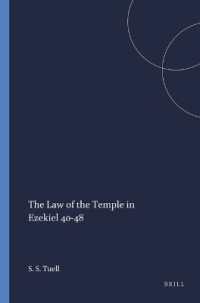- ホーム
- > 洋書
- > 英文書
- > Philosophy
基本説明
Presents Randière's body of work as a coherent whole, tracing key notions such as the distribution of the sensible, the aesthetics of politics, and the supposition of equality from his earliest writings through to his most recent interventions.
Full Description
The first comprehensive introduction to one of the most influential French thinkers writing today, exploring Ranciere's ideas on philosophy, aesthetics, and politics. "Jacques Ranciere: An Introduction" offers the first comprehensive introduction to the thought of one of today's most important and influential theorists. Joseph Tanke situates Ranciere's distinctive approach against the backdrop of Continental philosophy and extends his insights into current discussions of art and politics. Tanke explains how Ranciere's ideas allow us to understand art as having a deeper social role than is customarily assigned to it, as well as how political opposition can be revitalized. The book presents Ranciere's body of work as a coherent whole, tracing key notions such as the distribution of the sensible, the aesthetics of politics, and the supposition of equality from his earliest writings through to his most recent interventions. Tanke concludes with a series of critical questions for Ranciere's work, indicating how contemporary thought might proceed after its encounter with him.
The book provides readers new to Ranciere with a clear overview of his enormous intellectual output and develops his major. Engaging with many un-translated and unpublished sources, the book will also be of interest to Ranciere's long-time readers.
Contents
Acknowledgments; Introduction; 1. For A Critique of Philosophy; Introduction; 1.1. The Lesson of Althusser; 1.2. The Lessons of May; 1.3. Lessons From the Archives; 1.4. Lessons on Philosopher-Kings; 1.5. Lessons From Equality; Conclusion; 2. Politics By Process of Elimination; Introduction; 2.1. On the Terrain of Policed Consensus; 2.2. The Aesthetics of Counting; 2.3. Supposing, Verifying, and Demonstrating Equality; 2.4. Disputing Subjects and Litigious Objects: Politics as Dissensus; 2.5. The Subjective Process of Politics; Conclusion; 3. Retrieving the Politics of Aesthetics; Introduction; 3.1. Analyzing the Part of Art; 3.2. Three Regimes of Art; 3.3. Equality in Art; 3.4. In Place of Modernity; 3.5. Against Postmodernity; 3.6. Art as Dissensus; Conclusion; 4. Regimes of Cinema; Introduction; 4.1. A Historical Poetics of Cinema; 4.2. Cinema, the Dream of the Aesthetic Age; 4.3. The Logic of the Thwarted Fable; 4.4. Allegories of Modernity: Deleuze and the Use of Hitchcock; 4.5. Cinema and Its Century: Godard and the Abuse of Hitchcock; Conclusion; 5. Beyond Ranciere; Introduction; 5.1. Sensing Equality?; 5.2. The Centrality of the Imagination; 5.3. Inventing the Trans-Subjective Imagination; Conclusion; Notes; Bibliography; Index.







